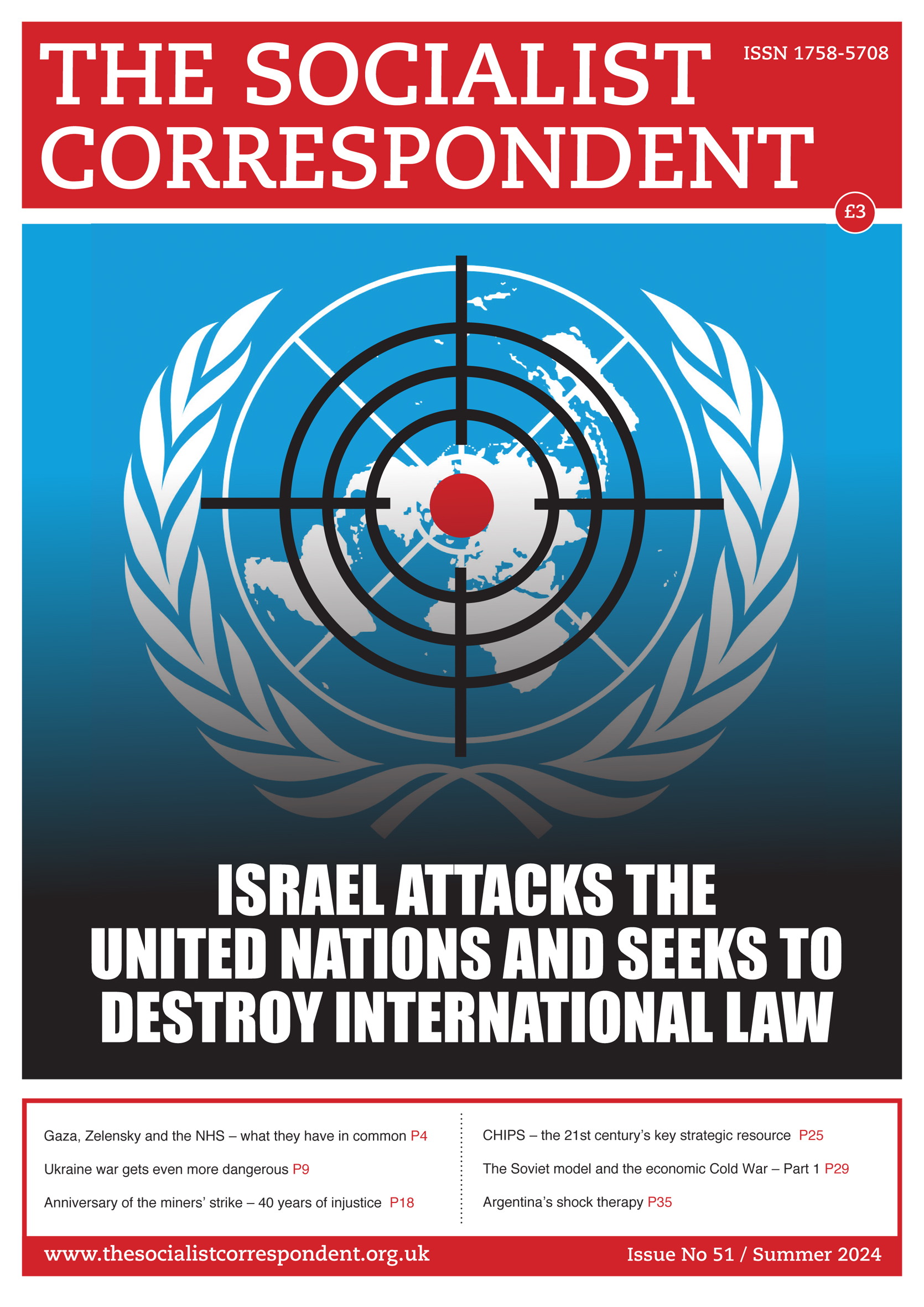Issue 51 Summer 2024
CONTENTS: The US and Israel attack the United Nations and international law, Brian Durrans Gaza, Zelensky and the NHS: what they have in common, Alex Davidson Ukraine war gets even more dangerous, Simon Korner Growing militarism a threat to the world, Pat Turnbull Anniversary of the miners' strike, Kate Flannery Capitalism's crisis and the threat to democracy, Gary Lefley CHIPS the 21st century's key strategic resource, Frieda Park the Soviet model and the economic cold war, Noah Tucker Argentina's shock therapy, Dan Morgan
COMMENTARY
The rift between the global south and the west has become deeper in the last few years. Countries of the south increasingly reject subservience to imperialist interests and are building their own political alliances and economic collaboration. From West African regimes asserting their independence from France and the US, to the growth and development of BRICS+ and the use of alternative means of payment to the US dollar the last few years have seen marked, if not yet decisive, change in the direction of a multipolar world.
Palestine
The Israeli’s genocidal war in Gaza has crystalised these divisions, with the majority of the world standing with the Palestinians. This in itself is a major setback for imperialism. Israel has tried to divert attention from its actions and drive in a wedge to the opposition by provoking Iran and risking a wider conflict, but that will not make the Palestinians and their suffering go away. Their stoic resistance remains as will our solidarity.
One front in this fight is Israel’s defiance of international law and the role played by the United Nations in censuring it and supporting the Palestinians. Writing about this in, The US and Israel attack the United Nations and International Law, Brian Durrans says that, “Palestinians are now the front line of defence for international law and the United Nations as its institutional expression.”
The west does not talk about international law, but rather the rules based order – by which it means its rules and its order. Whilst the United Nation has not always been progressive – the security council has an inbuilt western bias – yet it has always been an arena of struggle for anti-imperialist forces.
South Africa’s bold move taking Israel to the International Court of Justice has proved a rallying call for supporters of Palestine and upholding the international law which Israel flaunts.
Seeing the danger of the UN becoming a real force to counter western aggression Israel and the US have launched attacks on UN institutions, especially those which offer practical support to the Palestinians, like UNRAW. The global south, South Africa and the Palestinians are taking the lead in defending international legal norms from the west.
War
Yet despite the erosion of its influence the west continues on the road of confrontation and war. This includes preparing for a future war with China. Politically and economically the war in Ukraine is becoming less sustainable, with no sign that pouring more arms in is bringing Ukraine any closer to winning and every sign that it is losing. However, the mantra of western politicians remains that “Ukraine must win”. This has led to talk of dangerous escalation, like sending more advanced weaponry and NATO committing boots on the ground (more than the small number it already has). In Ukraine war gets even more dangerous Simon Korner spells out how desperation in Kiev and among Ukraine’s western backers is making the situation more volatile. Competing interests with the US and within Europe are complicating matters further and making a negotiated end to the war seem distant.
Of course there is money to be made from war and Ukraine and Gaza are no exceptions. The arms industry has certainly benefited from both these current conflicts. Increasingly, however, electronic systems are vital to fighting wars and in Gaza, Zelensky and the NHS: what they have in common, Alex Davidson examines one company with contracts in Israel, Ukraine and here in the NHS – that is Palantir. It has been described as “…the AI arms dealer of the 21st century” and works closely with the US government. So what is it doing in our NHS? Apparently “integrating health data”. Access to data is a prime objective of tech companies and Palantir’s role in the Health Service has met widespread opposition.
State repression
As we have seen a wave of strikes and massive demonstrations over Gaza, so the Tory government has been passing multiple pieces of legislation designed to restrict free speech, the right to protest and the right to strike. The rise of this repressive agenda is set out by Gary Lefley in, Capitalism’s crisis and the threat to democracy. But Kate Flannery reminds us that this is not a new tactic by the British state. In Anniversary of the miners’ strike - 40 years of injustice - demand for Orgreave inquiry will not be silenced she describes the systematic attack on picketing miners at Orgreave with many injured and imprisoned. There were meticulous plans formulated by the government and the police to crush the miners. She says, “Orgreave became the blueprint for the policing of dissent and sent a harsh message to working class people that strike action would be met by the full force of the state. 40 years later those falsely arrested and injured are still waiting to see justice.”
Alternative
We face a grim outlook of war, impoverishment and repression, but there is hope in the current resistance and protest. Also as Noah Tucker points out in The Soviet model and the economic Cold War - a refutation of the case against socialism, capitalism doesn’t work and he provides ample evidence that socialism does.
Read the PDF version of Issue 51

